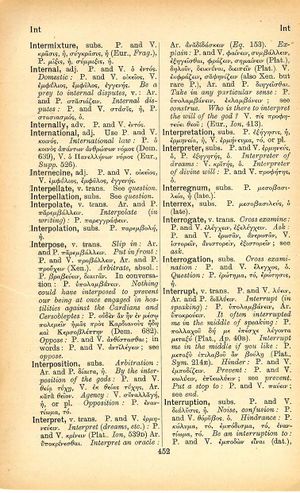interruption: Difference between revisions
From LSJ
Ὡς ἡδὺ δούλῳ δεσπότου χρηστοῦ τυχεῖν → Quam dulce servo lenem herum nanciscier → Wie froh macht einen Sklaven doch ein guter Herr
(Woodhouse 3) |
(CSV4) |
||
| Line 1: | Line 1: | ||
{{ | {{Woodhouse1 | ||
| | |Text=[[File:woodhouse_452.jpg|thumb|link={{filepath:woodhouse_452.jpg}}]]'''subs.''' | ||
P. and V. [[διάλυσις]], ἡ. | |||
<b class="b2">Noise, confusion</b>: P. and V. [[θόρυβος]]. ὁ. | |||
<b class="b2">Hindrance</b>: P. [[κώλυμα]], τό, [[ἐμπόδισμα]], τό, [[ἐναντίωμα]], τό. | |||
<b class="b2">Be an interruption to</b>: P. and V. ἐμποδὼν εἶναι (dat.), ἐμποδὼν [[γίγνομαι|γίγνεσθαι]] (dat.). | |||
<b class="b2">Without interruption, continuously</b>: use adv., Ar. and P. συνεχῶς, P. ἐνδελεχῶς, V. διανεκῶς (Aesch., ''Ag.'' 319). | |||
}} | }} | ||
Revision as of 09:44, 21 July 2017
English > Greek (Woodhouse)
subs.
P. and V. διάλυσις, ἡ. Noise, confusion: P. and V. θόρυβος. ὁ. Hindrance: P. κώλυμα, τό, ἐμπόδισμα, τό, ἐναντίωμα, τό. Be an interruption to: P. and V. ἐμποδὼν εἶναι (dat.), ἐμποδὼν γίγνεσθαι (dat.). Without interruption, continuously: use adv., Ar. and P. συνεχῶς, P. ἐνδελεχῶς, V. διανεκῶς (Aesch., Ag. 319).

